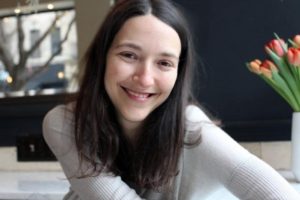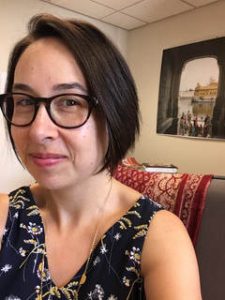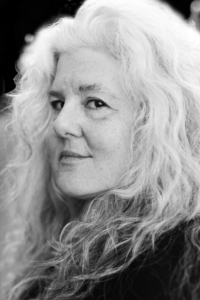FOW FORUM
Subscribe to the Friends of Writers Forum and receive notifications of new posts by email.
Poetry alum Leigh Lucas was recently featured in Two Hawks Quarterly. Read an excerpt of “Baby, This is Just to Say” below:

Baby, This is Just to Say
I don’t speak French very well so today I said to my cab driver, Virginie,
I said, Me, now, I am always proud, because if there is something, I can do it! Me. I can.
Do you understand?
To which she responded, Oui, which was mostly just nice of her
because I didn’t really either but I couldn’t stop speaking, I felt just like
a moon bounce on the up-jump, I said,
I can do things, just at me, all alone! I practically shouted it.
C’est merveilleux, she responded, and then I loved her as much as I love anyone in the world.
It was hard for me to say goodbye,
so I gave her my number in case she ever wanted to call,
no pressure, I said, but she didn’t understand because I said it in English.
Read the full poem here: Baby, This is Just to Say by Leigh Lucas – Two Hawks Quarterly
Leigh Lucas on the web:
2017 poetry alum Nomi Stone was recently featured in The Rumpus. Read an excerpt of “The Feeling Kept Growing” below:

The Feeling Kept Growing
Then, all the animals were Bearo & all
the boys, Gilly. A curly-horned
ram came over the hill: gently his snout
hurt into my morning. Algae at the lip
of the sea on my left, that green sear,
& fungus gloving the trees, while our kid
squawked in the pram, like he’d eaten
a happiness & wanted to roll it back
to share with the sea…
Read this poem in its entirety, as well as another, here: https://therumpus.net/2022/04/18/national-poetry-month-day-18-nomi-stone/
Poetry alum Chloe Martinez was recently featured in Beloit Poetry Journal and Palette Poetry. Read an excerpt of Chloe’s interview in Palette below:

Chloe Martinez, poet and scholar of South Asian religions, has a long-breathed relationship with the work of Mirabai, one of the earliest known women poets, who lived in north India in the late fifteenth/early sixteenth century. An ardent devotee of the god Krishna, Mirabai (or Mira) is also known as a Hindu saint. Chloe first encountered her song-poems in college and has been rereading and thinking about them ever since. Eventually, she also began to translate them from the original Braj Bhasa, an early form of Hindi—and to write her own poems influenced, in different ways at different times, by Mira’s.
“By Mira,” Chloe tells me, “I should really say ‘Mira’: we don’t really know which poems were written by a historical person, since they were first sung and shared orally, then gradually written down over centuries. It’s nearly certainly true that other people wrote songs in Mira’s persona and signed the poems with her name… Nevertheless, there’s a corpus of poems that are widely known today as ‘Mira poems’ and that’s what I’ve drawn from in [my] translations.”
Read this interview in its entirety here: https://www.palettepoetry.com/2022/01/27/the-guest-21/
Nancy Mitchell (Poetry ’91) recently interviewed poetry faculty member Dana Levin for Plume. Read an excerpt of their conversation below:


A Conversation with Nancy Mitchell and Dana Levin
NM: The title of the book, Now Do You know Where You Are, is taken from lines in Deepstep Come Shining, by the late C.D. Wright. In the title poem, you hear this phrase as a call to WAKE UP, Get your bearings, Hear the trees. What exactly was it about the momentary age of Trump that this call became an urgent command with a new ring of sound?
DL: It was uncanny, the way that phrase—now do you know where you are —ran through my head for months in the wake of the 2016 election. Wright had died at the start of that pivotal year, and it felt like visitation and instruction, hearing that phrase over and over post November. I think my book is driven by this call to wake up to where we are, as a nation, to where I am, as a poet, a citizen, a human—to not fall asleep to peril, which in America has to do with the fragility of our democratic processes and the rise to power of the country’s most violent, bigoted, and corrupt qualities; and peril in the self, where these corrupt qualities are harbored.
NM: This collection of poems chronicles a fervent quest to locate yourself in coordinates, the intersection where external forces meet history and place, where the soul and the body pressed against and into one another.
DL: Yes, the need to get located was profound for me after Trump’s election. In 2017 I found myself traveling through concentric circles of change. I was readying to leave Santa Fe, NM after nineteen years, to move to Saint Louis, a place I knew very little about, beyond Hollywood movies and Michael Brown’s death in 2014 at the hands of police in nearby Ferguson, the protests his death had sparked. I felt as though I was about to move to the navel of the nation: Saint Louis, source of so many American gifts and grotesqueries. Trump’s election and the hostilities it condoned also made me deeply afraid, as a Jew—a feeling shocking and new to me, though familiar to so many. Intellectually, I’d always understood antisemitism as a threat, but in 2017 that threat stopped being purely conceptual for me. My assumption of personal liberty, which I had always had the privilege to imagine strong, began to fray. Of course, that assumption has always been an illusion, but the American mythos of personal freedom carried me along for a long time. It was startling to discover how much I had internalized that mythos: me, a woman, a Jew, a daughter of immigrants, a poet!
Read this conversation in its entirety here: https://plumepoetry.com/d-lev-messenger/
Two poems by 2006 poetry alum Beverley Bie Brahic were recently featured in Literary Matters. Read an excerpt of “Blackberry Clafoutis” below:

Blackberry Clafoutis
A recipe I downloaded
Flutters on my desktop.
I keep thinking it’s a poem
Posted there
With its luscious title:
Blackberry irresistible surely
Essence of
My north’s high summer
Its punitive guarded
Providence
When one morning
Is just imperceptibly
Cold enough to turn
The gas-burning
Pot-bellied stove on
For an hour
Read the rest of this poem here: http://www.literarymatters.org/14-2-blackberry-clafoutis/